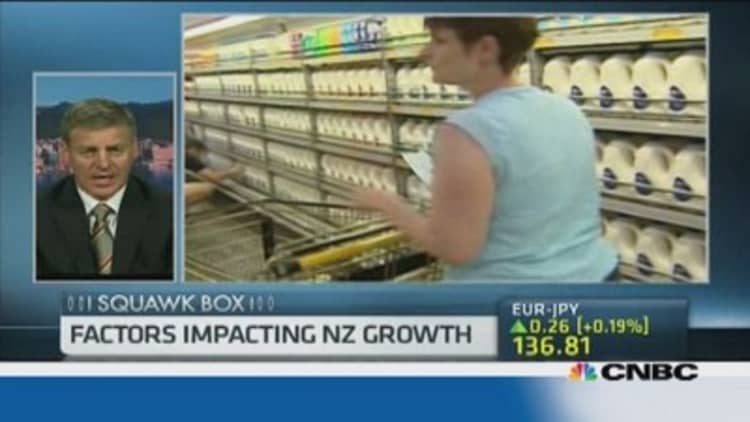New Zealand's central bank raised interest rates to the highest level in more than 5 years on Thursday but said it would now take a breather as it looked at the impact of its tightening and watched inflation in the economy.
The Reserve Bank of New Zealand lifted its official rate by 25 basis points to 3.50 percent, as expected, the fourth consecutive rise in as many meetings.
It said rates would need to return to a more neutral level, but the economy appeared to have slowed amid falling commodity prices and moderate inflation.
Read MoreMilk got your carry trade?
"It is prudent there now be a period of assessment before interest rates adjust further to a more-neutral level," RBNZ Governor Graeme Wheeler said in a statement.
He said the speed and extent of future rises would depend on the impact of its 100 basis points of tightening since March, and the strength of data.
The bank's forecasts in June implied the cash rate reaching 3.75 percent by the end of the year, two additional 25 basis point rate increases this year, and a steady pace through 2015.
Read MoreAustralia stocks: Good times to roll on
"Our view remains unchanged, we think the Reserve Bank is on hold until December, and they will start raising rates again then, but at a far more gradual pace," said ASB Bank chief economist Nick Tuffley.
Markets have scaled back expectations of rate rises in the next 12 months to 68 basis points from 92 basis points earlier this month after benign inflation data.

A Reuters poll before the latest statement has a consensus view that the RBNZ will pause until December before resuming rate rises.
The fell as low as $0.8609 from around $0.8703. Interest rate futures rallied, pushing their implied yields lower.
The bank said the economy was expected to grow 3.7 percent this year, although trading partner growth looked to have slowed.
It said the sharp fall in some commodity prices would feed through to primary sector incomes, but also meant the New Zealand dollar was unsustainably and unjustifiably high and faced a potential significant fall.
Read MoreDollar falls forsecond week, Kiwi charges higher
The kiwi has come off its highs in the past month, but the trade-weighted currency basket, the RBNZ's preferred currency measure, has remained about 1 percent above the bank's forecast.
The RBNZ said inflation was moderate, house price inflation has slowed and wages were subdued, but spare capacity was being used up and strong migration gains were adding to demand.

